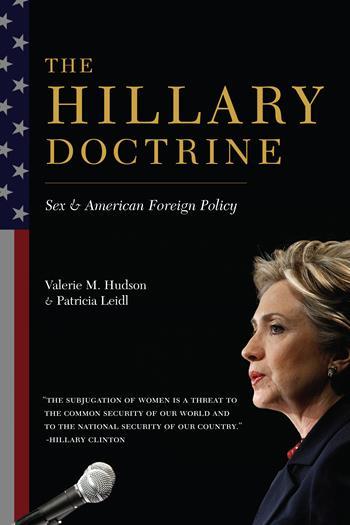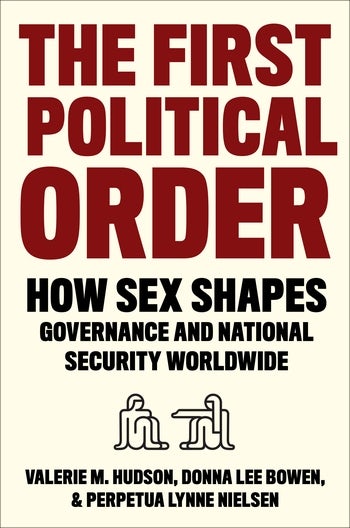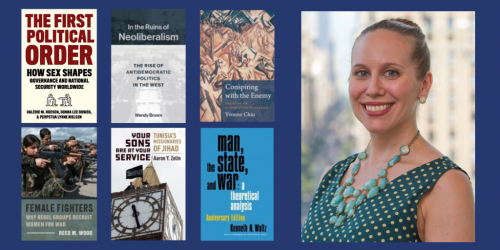The Hillary Doctrine and Saudi Arabia
“In the case of Saudi women, Clinton has chosen a course that appears to be penny-foolish, but is surely pound-wise.”—Valerie Hudson and Patrica Leidl, authors of The Hillary Doctrine
With yesterday’s announcement of her presidential campaign, the record of Hillary Clinton will undergo new rounds of scrutiny. This of course will include the policies and agendas she advanced while serving as Secretary of State. Chief among them is the protection and advancement of women’s rights, which became a cornerstone of her tenure as Secretary of State. In their forthcoming book, The Hillary Doctrine: Sex and American Foreign Policy, Valerie M. Hudson and Patricia Leidl argue that Hillary Rodham Clinton is the first Secretary of State to declare the subjugation of women worldwide a serious threat to U.S. national security.
However, as Secretary of State and as a key figure at the Clinton Foundation her commitment to women’s rights, some argue, has been undercut by her refusal to criticize certain Arab countries for their treatment of women. In fact, the Clinton Foundation has accepted large donations from many nations with abysmal records regarding women’s rights. In a recent article in Politico, Has Hillary Really Helped the World’s Women, Valerie Hudson and Patricia Leidl examine Clinton’s record and the options available to her regarding Saudi Arabia, a nation central to U.S. policy in the region but one that is often criticized for its treatment of women.
While Hudson and Leidl acknowledge some of the contradictions in Clinton’s stance regarding Saudi Arabia, they also recognize that publicly criticizing the current regime might not lead to positive change. More specifically, external criticism of the regime might endanger activists currently living in Saudi Arabia. Moreover, destabilizing or even removing the Saudi monarchy might lead to a far-worse scenario much like the ones that have played out elsewhere in the Arab world. Hudson and Leidl write:
Given the widespread nature of the Wahhabi belief system within the country, the fall of the Saudi monarchy would absolutely not result in an improved situation for women. On the contrary, what little gains Saudi women have made most certainly would be lost, as evidenced by the trajectory of the Islamic State-controlled Sunni “caliphate,” and indeed, the Arab world more generally. Far from hearkening in a brave new era of human rights, dignity and greater enfranchisement, the uprisings of more than three years ago have yielded not a single Arab country that has become a better place for women (though we are crossing our fingers for Tunisia).
In summing up some of the contradictions and conundrums confronting Clinton and others, Hudson and Leidl write:
The case of Saudi Arabia, then, provides an important lesson about the tradeoffs involved with public advocacy of women’s rights in the international arena—for Hillary Clinton, her successors at State and whomever the next president is. Too much public advocacy breeds defensiveness and even backlash among those one is trying to influence; too little public advocacy—too much silence—suggests to the world that these issues are not important after all and leads to despair among those one is trying to empower.
Clinton is silent apparently because she does not want the Saudi kingdom to stall or reverse ongoing, if slow-moving, progress for Saudi women. That in many ways is a justified stance, especially since the royals’ fall would be a catastrophe for Saudi women. At the same time, the Saudis not only export terror; they also are spreading the message of misogyny wherever their money and influence go. Indonesia, Kyrgyzstan, Uzbekistan, Syria—Saudi preaching of misogyny is making the lives of women across the Sunni world much harder. Effectively implementing the Hillary Doctrine, then, involves morally fraught decisions and unavoidable paradoxes. In the case of Saudi women, Clinton has chosen a course that appears to be penny-foolish, but is surely pound-wise. The problem is that Saudi women are not the only women affected by this choice. If the Clinton Foundation accepts Saudi donations, let’s hope they are used to offset that collateral damage.









1 Response